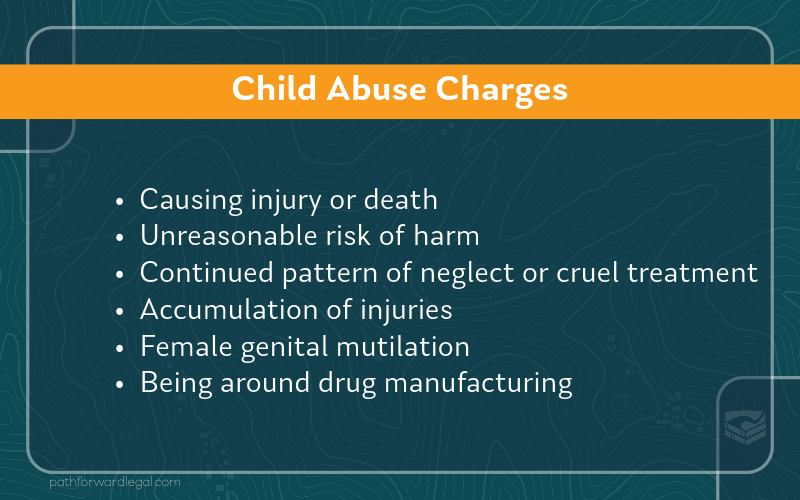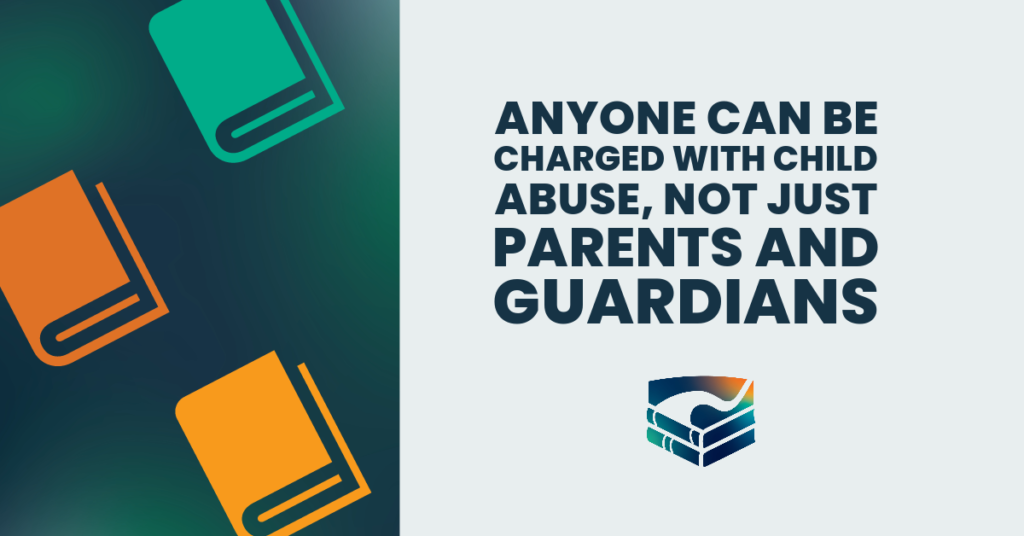At Path Forward Legal, our team of experienced and understanding child abuse defense attorneys is committed to defending your rights and guiding you through the legal process when facing child abuse allegations in Colorado. We recognize the severe implications these allegations can have on your life, reputation, and family, and we are dedicated to providing personalized, attentive, and strategic representation to achieve the best possible outcome for your case.
In Colorado, child abuse allegations can be made by family members, teachers, healthcare professionals, or other any other people who suspect abuse or neglect.
Some common scenarios leading to child abuse allegations include:
However, allegations can come from conduct that you wouldn’t expect. If you are accused of driving under the influence when a child is also in the car, you could also be charged with child abuse.
Another common cause of someone being charged with the crime is if a child is present when another crime is being committed. For example, in Adams County it is common to see someone who is charged with harassment of their spouse also be charged with child abuse if their child was also in the room.
Table of Contents

In Colorado, child abuse is defined by C.R.S. 18-6-401. It isn’t just about causing physical harm to a child. There are six main types of child abuse under the criminal statute.
A person commits child abuse if they cause an injury to the child’s life or health.
Most child abuse cases that you think of probably come from this subsection. If a person injures a child, no matter how small the injury, that is child abuse.
As with the rest of the child abuse subsections that we’ll cover, the potential penalties depend on the extent of the injuries and other circumstances surrounding the case.
Child abuse can also be caused by allowing a child to be “unreasonably placed in a situation that poses a threat of injury” to their life or health.
This subsection is often used when a person is charged with driving while intoxicated when a child is in the car. It can also be used to charge someone who fails to supervise their child who is found wandering on a busy highway.
Another way to commit child abuse is by engaging in a pattern of conduct that results in:
This list can be seen as the “catch all” list allowing police to charge someone with a crime for a pattern of things when one specific instance may not rise to the level of a crime.
One example could be charging a child’s parent for not adequately feeding them, causing the child to be malnourished. Missing a meal or two is not a crime. However, is child abuse when it results in malnourishment.
This subsection we’ve broken out from the list of “continued pattern of conduct” from above. It is child abuse to engage “in a continued pattern of conduct that results in…an accumulation of injuries that ultimately results in the death of a child or serious bodily injury to a child.”
With the way this subsection is written, this is the only pattern of conduct that requires the death or serious bodily injury of a child.
It is important to remember that the district attorney does not have to choose only one of these subsections when charging someone with a crime. It is likely that this subsection and the first we discussed — causing an injury — would both be charged if a series of small injuries ended up in a child’s death or serious injury.
Colorado law was modified in 1999 to classify female genital mutilation (FGM) as a form of child abuse. The American Academy of Pediatrics defines FGM as the medically unnecessary cutting of parts or all of the external female genitalia. The conduct could be cutting or reducing the opening of part of the external female anatomy.
Custom, ritual or “standard practice” is not a defense. However, there are affirmative defenses available to licensed medical providers who are preserving the health of the child or who are assisting the child in giving birth themselves.
The District Attorney must report anyone charged under this subsection to the US Immigration and Naturalization Service, if they believe the person is not a citizen or national of the US.
This is the first of three subsections that attempt to deal with the risk of drug manufacturing around children. It applies to any person who “knowingly engages in” the manufacture of a controlled substance or “knowingly possesses” certain substances with the intent to use them to manufacture a controlled substance.
If the manufacturing or possession occurs:
then the person commits child abuse. It is not a defense that the person did not know that a child was there or could be there.
In the subsection above, the person has to be attempting to manufacture a drug or in possession of certain substances. This subsection does not require that the person charged be actively involved in the manufacturing.
This subsection (and the next one) apply to:
Any caregiver who allows a child to be around the manufacturing of drugs like methamphetamine commits child abuse.
Like the previous section, the child doesn’t have to be in the room where the drug is being made. It is enough for the child to be on the premises, reside in the house, or be in a vehicle where the caregiver knows or reasonably should know that methamphetamine is being manufactured.
This subsection is similar to the one above. It applies to parents, guardians, and people taking care of a child. In this case, child abuse results from the caregiver allowing the child to be around substances that are used in the manufacturing of methamphetamine.
These substances are:
A child is any person under the age of sixteen years. This rule is found in C.R.S. 18-6-401(2) and applies to any of the charges under this law.

Any person can be charged with child abuse, not just a legal guardian. However, some of the types of child abuse require that the person be a parent, lawful guardian, or other person legally responsible for the care or custody of the child.
For example, any person who manufactures a controlled substance can be charged with child abuse if a child was present.
But what if the person was not manufacturing themselves but knows that the drugs were being cooked by someone else? Then, they are only guilty if the were a parent, guardian, or caretaker of the child and reasonably knew or should have known that the manufacturing of meth or other controlled substance was happening.
Child abuse allegations can lead to either felony or misdemeanor charges, depending on the situation. The severity of the charges depends on if an injury occurred and how serious it was. It also depends on if the person acts knowingly, recklessly, or with criminal negligence.
The penalty for violating these child abuse provisions depends on the situation. Consequences vary widely based:
We will cover the general provisions, but always contact an experienced criminal defense attorney if you are facing child abuse charges.
If someone causes the death of a child, they could be charged with felony child abuse or murder.
If the child is less than 12 years old, and the defendant is in a position of trust with respect to a child, then the crime is murder in the first degree if it was committed knowingly. The penalty in Colorado for first-degree murder is life imprisonment.
If one or more of those requirements are not met, then the crime is:
If child abuse results in serious bodily injury, then they can be charged with felony child abuse. The crime is:
“Serious bodily injury” is defined in C.R.S. 18-1-901. It requires bodily injury that involves:
If the child received some injury, but it did not rise to the level of serious bodily injury, then the crime is a misdemeanor. However, it can be elevated to a Class 5 felony in circumstances we’ll talk about below.
Generally it is Class 1 misdemeanor if the conduct was knowing or reckless. It is a Class 2 misdemeanor if the conduct was criminally negligent.
Any act of child abuse when no injury results is a Class 2 misdemeanor except in certain circumstances where it becomes a Class 5 felony. In this case, it does not matter if the act was knowing, reckless, or negligent.
In cases where there is minor or no injury, then child abuse is normally considered a serious misdemeanor offense. However, there are circumstances where the crime becomes a Class 5 felony. This can happen when the defendant has a prior conviction for abuse of a minor, and the new offense involves any of the following:
As you have seen, child abuse can be anywhere from a Class 2 misdemeanor to first degree murder. So what does this mean? How much jail time will someone serve if they are convicted of child abuse?
As we’ve said above, every case is different. If you want to know what you are facing if you are arrested for child abuse, then contact a Colorado criminal defense lawyer who can put your case and your options into perspective.
Generally, a person committing child abuse can face consequences ranging from a deferred prosecution to many years in jail. The class of crime lets you know what the minimum and maximum punishment can be.
Colorado groups almost all crimes into categories of severity. These range in increasing seriousness from petty offense to Class 2 then Class 1 misdemeanors, then to Class 6 through 1 felonies. Child abuse is an extraordinary risk crime, which further modifies the sentencing range. C.R.S. 18-6-401(7.3).
You may have noticed that Colorado child abuse crimes include knowing, reckless, and negligent acts. These are words that describe the type of intent that exists when a person acts.
A person acts “knowingly” if they are generally aware of one of two things:
The short-form of this is that the person knowingly acted in a way that was abusive or harmful, then it’s the most serious form of child abuse.
A person acts “recklessly” even if they did not actually intend a harm. Reckless child abuse happens when a person is aware of and consciously chooses to disregard a substantial and unjustifiable risk that their conduct could result in injury to a child’s life or health.
Criminal negligence requires the least amount of intent. Someone acts with criminal negligence when their actions are so far under the standard of care that a reasonable person would exercise, that they failed to perceive that their actions or lack of actions could result in injury to a child’s life or health.
Much like reckless child abuse, the risk to the child has to be substantial and unjustifiable. The difference is that with reckless behavior, the person knows of the risk and disregards it. For negligent behavior, the person fails to appreciate the risk.
To be in a position of trust, at the time of the alleged abuse, the person was responsible for the child’s health, education, welfare, or supervision.
This could be a parent, guardian, teacher, doctor, or babysitter. It does not matter what the person’s job title is or if they were being paid to watch the child. Anyone who has supervision of a child, even briefly, can be in a position of trust.
There are many defenses to child abuse charges. Sometimes law enforcement officials act quickly, but the person arrested was not harming the child at all. Sometimes reasonable parental discipline can be confused with child abuse.
Our Colorado child abuse defense attorneys have extensive experience handling these sensitive and complex cases. We will work diligently to build a strong defense on your behalf by thoroughly investigating your case, gathering evidence, and identifying any potential weaknesses in the prosecution’s arguments. Common defense strategies in child abuse cases include:
At Path Forward Legal, we understand that each case is unique and requires a tailored approach. We will work closely with you to develop a personalized defense strategy that takes into account your specific circumstances and goals.
Facing child abuse allegations can be an incredibly distressing and emotional experience. At Path Forward Legal, we’re dedicated to providing compassionate, understanding, and tenacious representation to help you through this challenging time. Our experienced attorneys have a proven track record of success in handling child abuse cases in Colorado and are committed to fighting for your rights and securing the best possible outcome.
By choosing Path Forward Legal, you can trust that you’ll receive:
If you or a loved one is facing child abuse allegations in Colorado, don’t wait – contact Path Forward Legal today for a confidential consultation. Our experienced child abuse defense attorneys are here to provide the guidance and support you need to navigate the complex legal process and move forward with your life. Let us help you on your path forward.

